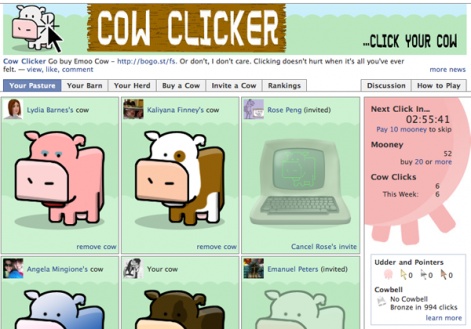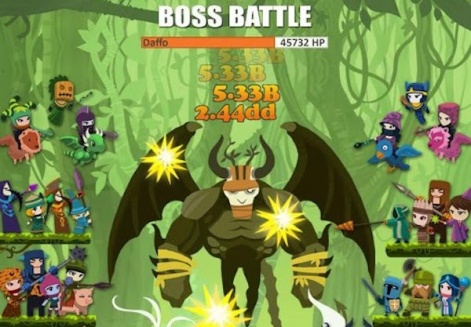If you want an example of how PC and mobile games are moving in opposite directions, this article about players getting banned from World of Warcraft for using auto-play bots is a good one.
As Chris Priestman points out, this automatic gameplay is something we're seeing more and more in mobile games, especially in the RPG space as games such as Heroes Charge or TD titles like Zombination show.
Of course, with mobile games, these auto-play features are typically specific modes, which enable players to do something in the game even when they don't have time for a 'proper' session.
But in another sense, are mobile games in danger of losing the thing that makes games fun - some sort of mastery of a task over time - and becoming just Cow Clickers?
Where do you stand on the auto-play question?
Cow Clicker is a great example: Designed to show the so-say shallowness of the mechanics of the likes of FarmVille, it backfired, blew up and showed just how powerful the sense of progression, when provided through a very simple core mechanic, is.
This is the whole mechanical basis for the incremental genre which is gaining popularity.
Auto-play, which is ostensible a Chinese mechanic, is another reflection that the mechanics of progression (aka the meta game) can be more powerful than the mechanics of the interaction. Which for western developers goes against a lot of assumptions of game design where we build the core mechanic and then attempt to retrofit progression loops around it.

However, as I understand it, Heroes Charge is less auto play, by use of special attacks, than equivalent Chinese titles. So maybe the western audience's taste is very different to China where players haven't had 30 years of skilled-testing console games.

A games programmer before joining Sony’s early PlayStation team in 1994, he then founded developer Pure Entertainment, which IPO’d and launched a free-to-play online gaming service way back in 1999.
He was also a director of pioneering motion gaming startup In2Games, which was sold to a US group in 2008.
Along the way, he’s been a corporate VP, troubleshooter, and non-exec to a variety of companies and investors in and around the games sector.
Harry was European CEO of Marvelous AQL, a Japanese developer and publisher of social, mobile and console games, known for console games like No More Heroes and Harvest Moon, but now highly successful in the free-to-play mobile and web space in Japan and Asia.
Harry is CEO of Magicave.
Will's nailed it.
If you feel an auto-play mechanic would spoil your game, you might need to go back to the drawing board.Harry Holwood
In games that have auto-play, I think of the 'play' bit as almost like a marketing hook or shop window.
It's there to get players into the game, but it's very much not the game. The game is about progression/strategy/collection.
What mobile, particularly in the east, has identified, is that the 'mastery of a physical skill' part of a game which, to many of us from a traditional game background was almost all that mattered, is only a small part of what can make games appealing to people.
I'd go as far to say that, if you're making a game and want to include collection/gacha/fusion type mechanics, but you feel that an auto-play mechanic would spoil your game, you might need to go back to the drawing board and make your 'meta game' more compelling than it currently is.
Will’s right. For a particular audience, the progression is the thing.
I’m reminded of the classic resource management game of the 1980s ... Ports of Call.
The brilliant idea was that if you didn’t want to engage in the simulation aspects of navigating ships in harbors, you could just ‘pay’ a NPC to do that. Not all players wanted to engage in that game mechanic.
This is going to play out with cross device Watch Games as well. You’ll have more interactive options on your phone. The watch interactions will be simpler and auto-play will play a role on builder games.
I feel that autoplay is a good thing.
World of Warcraft whining is no surprise.
It's just another game mode. Big Deal.
If you want mental justification, look at it as a test mode exposed to the user :)
Auto play is an innovation for mobile.
Designers have been saying all along that games on the phone require experiences with short spurts of interaction. Auto play makes total sense when it comes to that - an experience that doesn't require your full focus, where you can sit back and every now and then manage the game play as it becomes convenient.
You could go so far as to say an auto play game is a spin on a virtual pet experience, just in the case of an RPG your pet is your party.
Auto play can also play a part in bring the meaningful decisions to the forefront, instead of just navigating a menu and choosing attack every single time it's your turn, why not let the computer handle that while you deal with overall strategy and making sure your party has the proper equipment?
Auto play makes total sense when it comes to ... experiences requiring short spurts of interaction.Dave Castelnuovo
However, this is a lot different than auto play in World of Warcraft. In WoW, auto play is used to get a leg up on the competition in a game that was not balanced with auto play in mind. In this way, auto play is in fact cheating. You have an advantage over other players who are forced to put in actual time and effort.
That said, I don't think it would be a bad idea to create a WoW/MMO experience where auto play is more of a component and users aren't required to sit at their computers for 12 hours a day to level.
PC would be a good place for this kind of mechanic because you could multi-task while you are playing and the computer is a great place to multi-task (at work). On the other hand, I don't think this mechanic would be great for consoles because console play style basically ties you down in front of the TV.
TV forces you to choose a single content source and it's also communal. Sitting on the couch making 1 decision every 5 minutes or so would not make a very exciting experience for anyone else that happens to be in the room.
Also, I don't think it's cool to insinuate that a game like Cow Clickers somehow represents a low point of game design. Like it's the low point where all games with passive mechanics will eventually converge. The game might not be terribly polished but I would argue that its satire makes it a deep experience. It's a thinker.
I am proud of you Will, you are a wise owl!
Heroes Charge does require skill through the special abilities of each character. I tried to let the game play itself when I first heard of it, but it needed my interaction.
The WoW ban was something that was affecting the designed gameplay for years. The tool was a paid product called HonorBuddy. It allowed players to leave their computer and account logged in, while it just farmed honor or gold for them.
Here is a video of how bad it was getting.
HonorBuddy went undetected by the Battle.net login authentication for years until recently it was recently discovered at login.
The no-touch mobile mechanic is just another tool we have to try to make a fun and sticky experience for players. I currently have a Kindle Fire running for a week straight just collecting coins in a clicker game called Tap Titans.
It is silly really, feels like a Tamagotchi that won't die unless the battery dies. It even rewards bonus gold for turning the game back on. I have no idea if there is an end goal, or a reason I am fighting monsters. It just exists.

I personally like the idea of moving in real life as a game mechanic. The 3DS has a neat coin generator for moving around but lacks depth to the experience.
I would really like is a series of games that have a game mechanic that progresses through the player playing games that are made by the publisher.
I designed something like it that used my ad tech, Tap.Me, when Apple had the crack down on incentivised ads. The goal was to have any of the games using our platform to get random surprise bonuses for using other apps they discovered and played with our platform.
I never got to go live with it because the incentive ban didn't last very long.

Jon Hare is one of Europe's best known creative directors and game designers with over 10 international number one games to his name and nearly 30 years of experience in the games industry.
Jon co-founded and managed the legendary 1980/90s development company Sensible Software, creating games such as Sensible Soccer, Cannon Fodder and Wizball to great critical acclaim and commercial success and has also worked in senior posts in two of the UK's biggest games developer/publishers Codemasters and Jagex.
Since 1999 Jon has been one of the top game design and business development consultants in Europe working for many different publishing and development clients.
His own new company Tower Studios specializes in developing, publishing and licensing games on mobile and digital formats enjoying recent international success with the release of Speedball 2 Evolution and Word Explorer across numerous mobile and digital platforms.
Jon has also been a full BAFTA member for over 10 years, serving on the BAFTA Games Committee and is a regular Chairman of juries for BAFTA Games awards, as well as acting in a mentor capacity for both BAFTA and NESTA.
Will, you are spot on!!
There are three basic aspects to motivations within game design.
- 1. The actual mechanic of playing.
- 2. Progression and achievement (largely drives single player game modes).
- 3. Comparison and competition (largely drives multiplayer games).
As far back as 1994 in Europe when we released Sensible World of Soccer, we were designing games with layers you could take or leave.
In SWOS single player, you could play as player-only (mechanic), manager-only (progression) or as player/manager (mechanic and progression). In multiplayer it was all about head-to-head rivalry (competition).
Different people are attracted to different aspects of games.

Adam has been in the mobile game industry since 2007, creating games independently. He's since grown into a full 50+ person studio manager.
Recently he's taken a position at Wooga in Berlin to sharpen his design skills and work with the world's best to create amazing, well-crafted products onto the mobile marketplace.
On the topic of Auto-play & Idle games I've written multiple articles on it:
- http://mobilefreetoplay.com/2015/04/23/why-you-should-care-about-idle-games/
- http://mobilefreetoplay.com/2014/12/02/free-to-play-games-that-dont-want-you-to-play-them/
Overall it's a great mechanic when used effectively.
The reason why WoW doesn't want auto-play is because they want to be able to control it. Blizzard wants to enable auto-play only on their own terms (ex. auto generation of resources only comes from the Garrisons feature or the Follower Quests). They want to control the economy such that playing actively has separate rewards from the auto-play features.
Auto-play and automatic resource generation... performs the bait & switch needed to create long term retention.Adam Tefler
Thus making sure that players actually engage with the game on a regular basis, not just let the game play itself automatically. This makes sense for PC games. For mobile I think this has some value as well.
Auto-play and automatic resource generation is a great game mechanic when deployed properly in a game. It helps bridge the gap between a game that's fun for a week to a game that can be fun for months.
It performs the bait & switch needed to create long term retention. You come for the gameplay (the RPG fighting mechanic), but by the time you're burned out of playing the same battle over and over, you're onto the meta-game: auto-battling, upgrading units and using your resources effectively.
This metagame is perfect for mobile and perfect for free-to-play. Strong session drivers, strong monetization potential, but overall is a strong long term retention driver.

Oscar Clark has been a pioneer in online, mobile, and console social games services since 1998. He is also author of the book, Games As A Service – How Free To Play Design Can Make Better Games.
I totally understand the value of the progression play style. It’s absolutely a perfectly enjoyable mechanic in itself, but I still worry about it especially when it’s the player over-riding the intent of the game designer. That seems to me to hint at an underlying problem with the original design.
We have to consider where the fun is in the game and differentiate between the intrinsic rewards of play and the extrinsic rewards of progression.
Of course, to complicate things the progression or context loop of a game can be where the core entertainment lies, rather than the specific grind mechanic itself.
If a game encourages me not to play it, either by using a bot or by paying I am more likely to get annoyed, sometimes belligerent.Oscar Clark
In those cases autobot modes of play are fine, perhaps even preferred provided I still have some element of influence or autonomy in how that autobot performs. If there is no autonomy then almost by definition there is no gameplay.
That being said these kind of automated set-up and let loose games will be perfect for a wearable forms of gameplay. Imagine games with delightful progression, reporting intermittently to allow us to affect strategic choices could offer perfect watch gameplay experiences.
However, if a game encourages me not to play it, either by using a bot or by paying I am more likely to get annoyed, sometimes belligerent. I will play it in my own time and try to snub all forms of payment and shortcuts. Or more likely simply give up and find something more interesting instead and there are plenty of titles to fill the void.
Progression alone is not a game. Look at Clumsy Ninja. It’s a beautiful animation with delightful things going on, but there is no point. No sense of purpose so I don’t play.
Give me a game to play which offers intrinsic pleasure first, then complement that gameplay with autoplay modes to inspire me to return to play.
Even better let me use my smart watch to see that progress. But give me a sense of purpose, a reason to value the play.
Anything less disrespects the player.



























